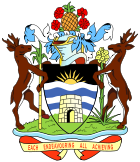 |
|---|
Elections in Antigua and Barbuda take place in the framework of a parliamentary democracy.
 |
|---|
Elections in Antigua and Barbuda take place in the framework of a parliamentary democracy.
Antigua and Barbuda's electoral law was passed on 31 October 1975 and was last amended in 2002. [1] Elections are overseen by the Office of the Supervisor of Elections and an Electoral Commission, which was established in 2002. The latter consists of five members appointed by the Governor-General; three (including the chair) on the advice of the Prime Minister and two on the advice of the leader of the opposition.
The House of Representatives has 17 elected members and two unelected members, the Attorney General and the Speaker. [2] Elections for the House are held every five years, although early elections can take place if Parliament is dissolved by the Prime Minister. By-elections must take place within 120 days of a member vacating their seat.
Members are elected via a plurality in single-member constituencies. [1] Voters must be aged 18 or over, be citizens of the country or citizens of a Commonwealth country who has lived in the country for at least three years prior to a qualifying date, and have been resident in the constituency for at least a month prior to the qualifying date. [1]
Candidates must be at least 21 years old, citizens of the country, and have lived in the country for at least a year prior to the elections. [1] They must also have the ability to speak and (unless blind) be able to read English with "sufficient proficiency". Those with dual citizenship or an undischarged bankruptcy are ineligible, as are those who have been imprisoned for more than a year or have committed electoral offences within the previous ten years, or are insane or under a death sentence. [1]
The Senate is unelected and consists of 17 members appointed by the Governor-General; eleven on the advice of the Prime Minister, four on the advice of the leader of the opposition, one on the advice of the Barbuda Council and one at the discretion of the Governor-General. [3]
Universal suffrage was introduced in 1951, although less than 20% of the population was registered to vote during the 1950s. [3] The first elections held under this system resulted in a victory for the Antigua Labour Party, which won all eight seats. The ALP dominated Antiguan politics, winning every seat in elections held in 1956, 1960 and 1965. During this period voter turnout remained low, dropping to just 38% for the 1960 elections. [4] Although they were defeated by the Progressive Labour Movement in 1971, the party regained power in 1976 (despite receiving fewer votes than the PLM) and remained the ruling party until 2004 under the leadership of Vere Bird and later his son, Lester Bird. During this period elections were considered to be neither free nor fair. [5] After taking over from his father prior to the 1994 elections, Lester had promised to fight corruption. However, the elections that year remained neither free nor far, with no guarantee of secret balloting, a voter registration open to abuse and the voter roll being inflated by 25% with emigrants or deceased residents. [6] Continued irregularities in the 1999 elections were noted by a Commonwealth observer group, which recommended the establishment of an independent Electoral Commission and year-round registration for elections. [7] The Commission was set up in 2001 and the ALP's second period of dominance ended with defeat by the United Progressive Party in the 2004 elections. The UPP won a second term in office in 2009. However, in the 2014 general election, the Antigua Labour Party won 14 of 17 seats, while the ruling UPP won the other three seats. In the 2018 general election, held on 21 March, the ABLP won 15 seats, the UPP won 1 seat and the Barbuda Peoples Movement the seat for Barbuda.

The politics of Antigua and Barbuda takes place in a framework of a unitary parliamentary representative democratic monarchy, wherein the sovereign of Antigua and Barbuda is the head of state, appointing a governor-general to act as vice-regal representative in the nation. A prime minister is appointed by the governor-general as the head of government, and of a multi-party system; the prime minister advises the governor-general on the appointment of a Council of Ministers. Executive power is exercised by the government. Legislative power is vested in both the government and the two chambers of the Parliament. The bicameral Parliament consists of the Senate and the House of Representatives.
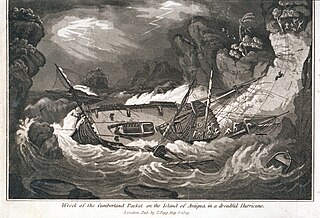
The history of Antigua and Barbuda covers the period from the arrival of the Archaic peoples thousands of years ago to the present day. Prior to European colonization, the lands encompassing present-day Antigua and Barbuda were inhabited by three successive Amerindian societies. The island was claimed by England, who settled the islands in 1632. Under English/British control, the islands witnessed an influx of both Britons and African slaves migrate to the island. In 1981, the islands were granted independence as the modern state of Antigua and Barbuda.
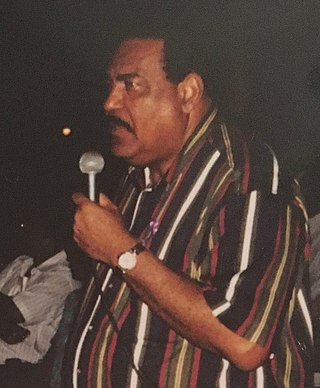
Sir Lester Bryant Bird was an Antiguan politician and athlete who served as the second prime minister of Antigua and Barbuda from 1994 to 2004. He was chairman of the Antigua Labour Party (ALP) from 1971 to 1983, then became prime minister when his father, Sir Vere Bird, the previous prime minister, resigned.

Sir Vere Cornwall Bird, KNH was the first Prime Minister of Antigua and Barbuda. His son, Lester Bryant Bird, succeeded him as Prime Minister. In 1994, he was declared a "National Hero".

The Antigua and Barbuda Labour Party (ABLP) is a political party in Antigua and Barbuda. The current leader of the party is Gaston Browne, who serves as the Prime Minister of Antigua and Barbuda. The party had previously been led by Lester Bird, who was chairman of the party since 1971, and was Prime Minister and political leader in 1994.
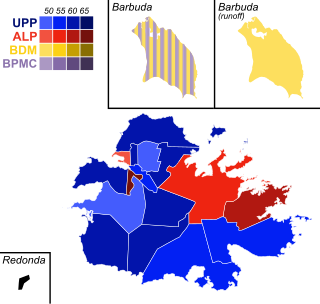
General elections were held in Antigua and Barbuda on 23 March 2004. The result was a victory for the opposition United Progressive Party (UPP), which defeated the incumbent Antigua Labour Party. Baldwin Spencer, leader of the UPP, replaced Lester Bird as Prime Minister of Antigua and Barbuda, with Bird being one of eight Labour MPs to lose his seat. Spencer became only the second Prime Minister from outside the Bird family or the Labour Party.
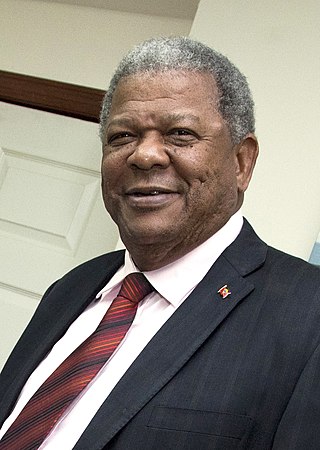
Winston Baldwin Spencer is an Antiguan politician who was the third prime minister of Antigua and Barbuda from 2004 to 2014.

Elections in the Bahamas take place in the framework of a parliamentary democracy. Since independence, voter turnout has been generally high in national elections, with a low of 87.9% in 1987 and a high of 98.5% in 1997. The current Prime Minister is The Hon. Philip Davis.

The Progressive Labour Movement was a major centre-left political party in Antigua and Barbuda and, until the 2000s, was the only political party to have defeated the Antigua Labour Party in an election.
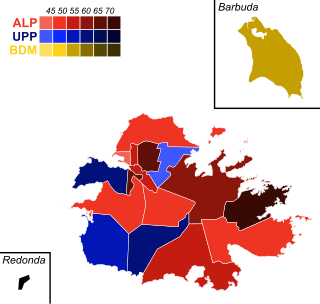
General elections were held in Antigua and Barbuda on 9 March 1999. The elections were won by the governing Antigua Labour Party. Lester Bird was re-elected Prime Minister of Antigua and Barbuda. Voter turnout was 63.6%.

General elections were held in Antigua and Barbuda on 8 March 1994. They were won by the governing Antigua Labour Party under the leadership of Lester Bird. Bird had been appointed leader of the ALP before the elections, after his father and predecessor Vere Bird announced his intention to retire. Lester Bird became Prime Minister after elections. Voter turnout was 62.3%. This was the first election contested by the United Progressive Party, under future Prime Minister Baldwin Spencer.
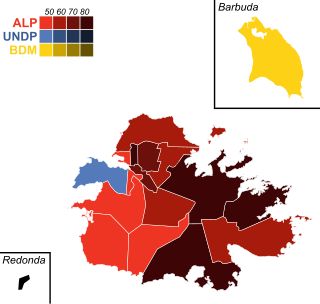
General elections were held in Antigua and Barbuda on 9 March 1989, the second after it had become an independent Commonwealth realm. The elections were won by the governing Antigua Labour Party (ALP), whose leader Vere Bird was reelected as Prime Minister. Voter turnout was 60.7%.

General elections were held in Antigua and Barbuda on 17 April 1984, the first after the country had become an independent Commonwealth realm in 1981.

The Government of Antigua and Barbuda (GOAB), is a unitary constitutional monarchy, where the Monarch of Antigua and Barbuda serves as the head of state, represented by the Governor-General of Antigua and Barbuda, and the Prime Minister of Antigua and Barbuda serves as the head of government.

General elections were held in Antigua and Barbuda on 18 February 1976. Whilst the Progressive Labour Movement received the most votes, the opposition Antigua Labour Party won more than double the number of seats. ALP leader Vere Bird was elected Premier of Antigua. Bird had previously served as head of government of Antigua and Barbuda between 1960 and 1971. He defeated the incumbent Premier George Walter of the Progressive Labour Movement.

General elections were held in Antigua and Barbuda on 24 April 1980. They were won by the governing Antigua Labour Party. ALP leader Vere Bird was re-elected as Prime Minister of Antigua and Barbuda. Voter turnout was 77.1%.
Vere Bird Jr. was an Antiguan lawyer and politician who served as chairman of the Antigua Labour Party (ALP) and a government minister. He was the son of Vere Bird, the former Prime Minister of Antigua and Barbuda, and brother of Lester Bird, who later held the same position.
Sir Robin Yearwood KGCN is an Antiguan politician and member of the Antigua Labour Party (ALP). Entering Parliament in 1976, Yearwood served as Minister of Agriculture, Land and Fisheries in the ALP administration until a cabinet reshuffle in 1987 saw him take over Vere Bird, Jr.'s portfolio for Aviation, Public Information and Public Utilities. Despite a failed attempt to oust the Prime Minister he retained this position, and kept it when he became Deputy Prime Minister on 9 September 2002 and Minister of Finance a year later. Following the ALP's loss in the 2004 election, Yearwood was one of only three ALP members left in the lower house, and became Leader of the Opposition. He held this position until 2006, when he was replaced with Steadroy Benjamin.

General elections were held in Antigua and Barbuda on 12 June 2014. The result was a victory for the opposition Antigua and Barbuda Labour Party led by Gaston Browne, which won 14 of the 17 seats. Following the election, Browne became the country's youngest Prime Minister.

General elections were held in Antigua and Barbuda on 18 January 2023 to elect members of the House of Representatives. The Labour Party (ABLP) has held an absolute majority of 15 seats in the House of Representatives after the 2018 general election, with Gaston Browne remaining as prime minister. Browne initiated a constitutional referendum after the 2018 election, which was rejected by voters, and following the death of Elizabeth II in 2022, he announced his intention to organise a referendum for the transition of Antigua and Barbuda to a republican system. Besides ABLP, the United Progressive Party (UPP), Democratic National Alliance, Barbuda People's Movement (BPM), and three independent politicians filed candidacies for the 2023 general election.